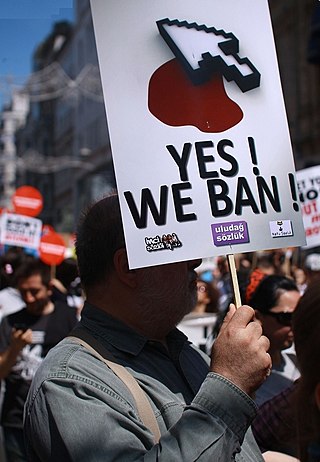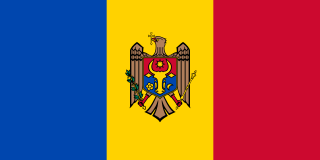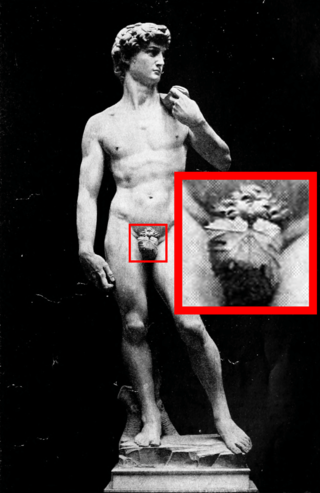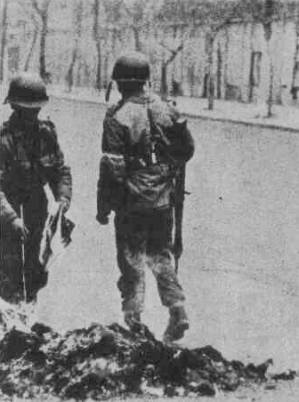Related Research Articles
Censorship in Singapore mainly targets political, racial, religious issues and homosexual content as defined by out-of-bounds markers.

Printed media in the Soviet Union, i.e., newspapers, magazines and journals, were under strict control of the CPSU and the Soviet state. The desire to disseminate propaganda was believed to had been the driving force behind the creation of the early Soviet newspapers. Newspapers were the essential means of communicating with the public, which meant that they were the most powerful way available to spread propaganda and capture the hearts of the population. Additionally, within the Soviet Union the press evolved into the messenger for the orders from the CPSU Central Committee to the party officials and activists. Due to this important role, the Soviet papers were both prestigious in the society and an effective means to control the masses; however, manipulation initially was not the only purpose of the Soviet Press.

Censorship in the Soviet Union was pervasive and strictly enforced.
Censorship in South Korea is implemented by various laws that were included in the constitution as well as acts passed by the National Assembly over the decades since 1948. These include the National Security Act, whereby the government may limit the expression of ideas that it perceives "praise or incite the activities of anti-state individuals or groups". Censorship was particularly severe during the country's authoritarian era, with freedom of expression being non-existent, which lasted from 1948 to 1993.

Communist propaganda is the artistic and social promotion of the ideology of communism, communist worldview, communist society, and interests of the communist movement. While it tends to carry a negative connotation in the Western world, the term propaganda broadly refers to any publication or campaign aimed at promoting a cause and is/was used for official purposes by most communist-oriented governments. The term may also refer to political parties' opponents' campaign. Rooted in Marxist thought, the propaganda of communism is viewed by its proponents as the vehicle for spreading their idea of enlightenment of working class people and pulling them away from the propaganda of who they view to be their oppressors, that they claim reinforces exploitation, such as religion or consumerism. Communist propaganda therefore stands in opposition to bourgeois or capitalist propaganda.
Germany has taken many forms throughout the history of censorship in the country. Various regimes have restricted the press, cinema, literature, and other entertainment venues. In contemporary Germany, the Grundgesetz generally guarantees freedom of press, speech, and opinion.
Censorship in Cuba is the topic of accusations put forward by several foreign groups-organizations and political leaders, as well as Cuban dissidents. The accusations led the European Union to impose sanctions from 2003 to 2008 as well as statements of protest from groups, governments, and noted individuals.

Censorship in Turkey is regulated by domestic and international legislation, the latter taking precedence over domestic law, according to Article 90 of the Constitution of Turkey.

The mass media in Moldova refers to mass media outlets based in the Republic of Moldova. Television, magazines, and newspapers are all operated by both state-owned and for-profit corporations which depend on advertising, subscription, and other sales-related revenues. The Constitution of Moldova guarantees freedom of speech. As a country in transition, Moldova's media system is under transformation.

Censorship is the suppression of speech, public communication, or other information. This may be done on the basis that such material is considered objectionable, harmful, sensitive, or "inconvenient". Censorship can be conducted by governments, private institutions, and other controlling bodies.

Eastern Bloc media and propaganda was controlled directly by each country's communist party, which controlled the state media, censorship and propaganda organs. State and party ownership of print, television and radio media served as an important manner in which to control information and society in light of Eastern Bloc leaderships viewing even marginal groups of opposition intellectuals as a potential threat to the bases underlying communist power therein.
Censorship in Bangladesh refers to the government censorship of the press and infringement of freedom of speech. Article 39 of the constitution of Bangladesh protects free speech.
Censorship in Brazil, both cultural and political, occurred throughout the whole period following the colonization of the country. Even though most state censorship ended just before the period of redemocratization that started in 1985, Brazil still experiences a certain amount of non-official censorship today. The current legislation restricts freedom of expression concerning racism and the Constitution prohibits the anonymity of journalists.
Censorship in Communist Romania occurred during the Socialist Republic in two stages: under the first Communist president Gheorghe Gheorghiu-Dej (1947-1965) and the second and last Communist president Nicolae Ceaușescu (1965-1989).

Book censorship is the act of some authority taking measures to suppress ideas and information within a book. Censorship is "the regulation of free speech and other forms of entrenched authority". Censors typically identify as either a concerned parent, community members who react to a text without reading, or local or national organizations. Books have been censored by authoritarian dictatorships to silence dissent, such as the People's Republic of China, Nazi Germany and the Soviet Union. Books are most often censored for age appropriateness, offensive language, sexual content, amongst other reasons. Similarly, religions may issue lists of banned books, such as the historical example of the Roman Catholic Church's Index Librorum Prohibitorum and bans of such books as Salman Rushdie's The Satanic Verses by Ayatollah Khomeini, which do not always carry legal force. Censorship can be enacted at the national or subnational level as well, and can carry legal penalties. In many cases, the authors of these books could face harsh sentences, exile from the country, or even execution.
State-sponsored Internet propaganda is Internet manipulation and propaganda that is sponsored by a state.
Censorship in the Czech Republic had been highly active until 17 November 1989 and the fall of Communism in the former Czechoslovakia. Czech Republic was ranked as the 13th most free country in the World Press Freedom Index in 2014.
Censorship in Indonesia has varied since the country declared its independence in 1945. For most of its history the government of Indonesia has not fully allowed free speech and has censored Western movies, books,films, and music as well. However, partly due to the weakness of the state and cultural factors, it has never been a country with full censorship where no critical voices were able to be printed or voiced.
Censorship in Vietnam is pervasive and is implemented by the Communist Party of Vietnam (CPV) in relation to all kinds of media – the press, literature, works of art, music, television and the Internet. The government censors content for mainly political reasons, such as curtailing political opposition, and censoring events unfavorable to the party. In its 2021 Press Freedom Index, the Reporters Without Borders (RSF) ranked Vietnam as "very serious" at 174 out of 180 countries, one of the lowest in the world and the worst ranking on their five-point scale. Similarly, Freedom House's 2021 Freedom on the Net report classifies Vietnam as "not free" in relation to the Internet, with significant obstacles to access, limits on content and significant violations of user rights.
Censorship in Poland was first recorded in the 15th century, and it was most notable during the Communist period in the 20th century.
References
- ↑ "2015 prison census: 199 journalists jailed worldwide". 22 January 2015.
- ↑ Costa, Iná Camargo (2001). "Teatro político no Brasil". Trans/Form/Ação. 24: 113–120. doi: 10.1590/S0101-31732001000100008 .
- ↑ "10 most censored countries". The Committee to Protect Journalists.
- ↑ "Fresh Off Worldwide Attention for Joining Obama's Book Collection, Uruguayan Author Eduardo Galeano Returns with "Mirrors: Stories of Almost Everyone"". Democracy Now!. Retrieved 2020-11-25.
- ↑ Troianovski, Anton (2022-03-04). "Russia Takes Censorship to New Extremes, Stifling War Coverage". The New York Times. ISSN 0362-4331 . Retrieved 2022-04-29.
- ↑ Wagner, Astrid; Navarro, Oriol (6 March 2022). "Desinformación y censura, dos herramientas clave de la guerra en Ucrania". The Conversation. Retrieved 2022-04-29.